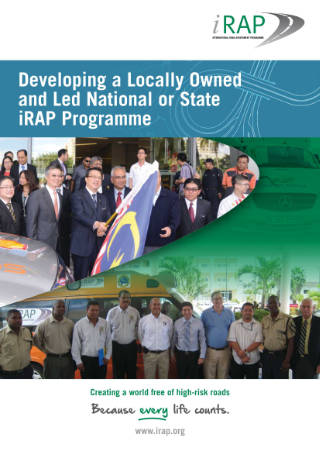Developing a Locally Owned and Led National or State iRAP Programme

Every day, more than 3,500 people die in road crashes worldwide; 100,000 or more are injured or disabled. Road trauma is a serious and ongoing public health crisis. Crash costs are typically 2-5% of national GDP each year, impacting every country on earth. In particular, this crisis affects developing countries, where 9 out of 10 road deaths occur.
The United Nations has included road safety as a Sustainable Development Goal (3.6) setting the challenge of halving the number of global deaths and injuries from road traffic crashes by 2020. In addition, the UN Global Road Safety Performance Targets include objective and achievable targets for all new roads to be built to a 3-star or better standard for all road users (Target 3), and more than 75% of travel is on the equivalent of 3-star or better roads for all road users by 2030 (Target 4). iRAP believes that road death and injury is preventable and that the solutions exist. Improving the world’s roads to a 3-star or better standard for all road users is a key way to meet the UN targets in combination with action across all the established road safety pillars. Achieving >75% of travel on 3-star or better roads by 2030 will save an estimated 467,000 lives every year.
iRAP’s systematic approach can help save thousands of lives. It involves simple, affordable improvements to road infrastructure and speed management that can dramatically reduce both the risk of crashes occurring and their severity.
iRAP programmes can be easily integrated into existing or new road safety initiatives in a country:
- Risk Maps provide a global standard to measure and benchmark historical crash performance and target action;
- Star Ratings provide an objective, evidence-based global measure of the safety of infrastructure for pedestrians, cyclists, motorcyclists and vehicle occupants;
- Safer Road Investment Plans can help shape an upgrade programme and Safer Roads Fund that will maximise lives saved per unit of investment; and
- Policy and performance tracking tools provide agencies with the ability to measure and manage success.
This brochure is designed to help countries develop their own locally owned and led national or state programmes and develop and deliver projects that save lives.
iRAP is a member of the United Nations Road Safety Collaboration and Global Alliance of NGOs for Road Safety and works closely with the World Health Organisation, FIA Foundation, World Bank, International Transport Forum, PIARC, OECD and other road safety stakeholders to support and coordinate global action across all pillars of action on road safety.